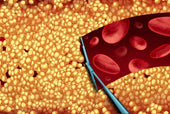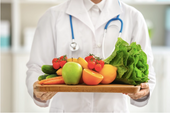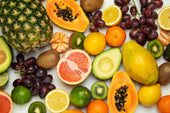Pregnancy is a special stage in a woman's life, full of changes and new challenges. One of the most important aspects during this period is proper nutrition, which directly affects the health of both the expectant mother and the baby.
Properly selected foods can help you overcome symptoms that occur during pregnancy, and after childbirth, you can regain strength faster and take care of your baby's well-being. So which products should you prioritize and which ones should you avoid? Lifestyle medicine specialist Kristina Šlekienė talks about the basic rules of healthy eating during pregnancy and after childbirth.
The importance of the mother's eating habits
According to K. Šlekienė, pregnant and postpartum women should consider not only the balance of nutrients consumed, but also the amount of vitamins and minerals obtained from food or supplements.
"Many changes occur in a pregnant woman's body that require additional energy. The fetus receives nutrients from the woman's blood, so it is important that the pregnant woman's diet meets all the needs of the fetus. An unbalanced diet can lead to a lack of certain nutrients, which can slow down the development of the fetus, and also increases the risk of a low-birth-weight newborn. Nutrition during both pregnancy and breastfeeding requires special attention, so it is necessary to ensure that the necessary amount of energy, protein, minerals and vitamins is received," says K. Šlekienė.
The specialist emphasizes that a fetus's nutrition is not only related to its health in infancy or childhood, but also has an impact in adulthood.
"Scientific studies show that the fetus's body adapts in response to insufficient amounts of nutrients. However, after birth, increased food intake may affect the risk of cardiovascular and metabolic diseases in early childhood and adolescence. Therefore, the risk of developing chronic diseases in adulthood, such as arterial hypertension, obesity, diabetes mellitus, and ischemic heart disease, increases. Bad eating habits during pregnancy greatly increase the risk of gestational diabetes, excessive weight gain during pregnancy, and macrosomia (excessive baby weight, i.e. more than 4 kg)," says the lifestyle medicine specialist.
Often iron deficient
K. Šlekienė adds that one of the most common health problems faced by pregnant women is anemia, therefore special attention should be paid to a balanced diet.
"To prevent anemia, it is advisable to eat foods rich in iron more often. It is important for fetal development, helps prevent anemia, and strengthens the immune system. Iron needs are uneven during pregnancy, and it is minimal in the first trimester. Iron absorption increases as pregnancy progresses. With anemia, the fetus receives too little oxygen, which is needed for growth, and therefore is born with a lower weight. Therefore, it is very important to include products rich in iron in your diet: eat parsley, spinach, apples, pumpkin, whole grain bread, buckwheat, nuts, lean beef, fish, dried boletus, Spanish sage seeds, wheatgrass. You can also find iron in nettle and strawberry leaf and plantain teas. Strawberries, strawberries, blueberries, sea buckthorn and cloudberry berries, and black currants are also rich in iron," says the specialist.
Need more calories
The lifestyle medicine specialist reminds that women who have given birth should consume more calories.
"A breastfeeding mother should be aware that the daily calorie intake of her food ration increases during this period and she should not be afraid of it. During pregnancy, the need for calories increases by only 200–450 kcal, but during breastfeeding, the need for energy increases, therefore it is recommended to obtain an additional 476–500 kcal from food per day. In general, a breastfeeding mother should not follow any diets. Women should only give up those products to which they are allergic and those that they did not tolerate before pregnancy. When breastfeeding, you need to eat more often, but in small portions. It is important to follow a diet and eat as varied, seasonal and high-quality food as possible every day, which should be prepared at home," says K. Šlekienė.
However, the specialist adds that pregnant or newly-born women should avoid certain products.
"Salty, spicy, fatty and smoked food products are not allowed. A pregnant or breastfeeding mother should refuse food from public catering establishments, and she should not eat semi-finished products, because the food must be fresh and made from quality products. It is important to know that food should not be reheated. It is advisable to avoid products containing a lot of saturated fat, such as butter, fatty meat, cream, palm, coconut oil, etc. Sugar, sweets, and sweetened drinks should also be consumed rarely and in limited quantities. After finding out about pregnancy, raw meat and fish should not be eaten. It should be prepared at a temperature not lower than 165 degrees. It is also advisable to avoid mold, feta cheese and other unpasteurized dairy products, carbonated drinks, alcohol, and strong coffee. Not only coffee is not recommended, but also caffeinated drinks. "A higher amount of caffeine increases the risk of spontaneous miscarriage, and if a breastfeeding mother consumes caffeine-containing products, the breastfed baby also receives it, which may make it more irritable," warns K. Šlekienė.
At least 400 grams of vegetables and fruits per day
According to the specialist, vegetables and fruits play a very important role in the diet of pregnant and postpartum women. She reminds us that the World Health Organization recommends consuming at least five servings of fruits and vegetables a day.
"A person should consume at least 400 grams of fruits and vegetables every day. Vegetables should be eaten with every meal or snack, and fruit or berries should be eaten once a day. The ratio should be 1/3, which means 1 fruit and/or a handful of berries per day and 3 vegetables per day," the woman says.
However, K. Šlekienė adds that not everyone consumes the required amount of fruits and vegetables. Therefore, according to the specialist, freeze-dried products can also be used, which are easier to use and, in many cases, tastier.
"These days, we can find many products that help us consume the required amount of fruits and vegetables. One of these is the freeze-dried fruit, berry and vegetable powder mixtures "fruttbery" . They can help us more easily ensure the daily recommended intake of fruits and vegetables and at the same time increase their variety. The freeze-drying process ensures the microbiological safety of the product, without the use of chemical additives, preservatives, or added sugar. The fruits and vegetables used for these mixtures are harvested in ideal condition and immediately freeze-dried. This means that such fruits and vegetables do not lose nutrients, unlike those that are just on their way to the points of sale. Freeze-dried products also preserve vitamins, carotenes, and antioxidants much better," says K. Šlekienė.
The most common mistake is dieting.
Speaking about the most common nutritional mistakes made by pregnant or postpartum women, K. Šlekienė mentions dieting.
"One of the most common mistakes is following various diets. For example, both vegan and vegetarian diets during pregnancy are possible only if nutritional supplements are used and healthcare professionals are consulted. However, a strict vegan diet, which contains only plant products, poses a significant risk to the health of the mother and fetus, especially the development of the child's nervous system. By eating this way, a pregnant or breastfeeding mother does not receive enough energy, protein, long-chain polyunsaturated fatty acids, iron, iodine, calcium, zinc, and vitamins B12 and D, which is why the use of nutritional supplements becomes necessary," says the interviewee.
The specialist adds that in her work she often notices that pregnant women eat too few vegetables and fruits, do not give preference to organic products, and snack on convenience foods that are high in trans fats. The specialist also names low fluid intake as a common mistake. According to her, pregnant women do not forget to sip water and drink enough of it, but after giving birth, water intake decreases significantly.
It's important to remember fiber
According to K. Šlekienė, due to hormonal changes, intestinal motility slows down in pregnant women, and with it, digestive processes, which is why many people start to experience gas and bloating. It is believed that bloating and constipation are characteristic of 16–39 percent of pregnant women. In order to avoid these phenomena, the specialist encourages the consumption of products containing a lot of fiber.
"A sufficient amount of fiber should be included in the daily diet of a pregnant or breastfeeding mother. Fiber should be consumed at about 25–30 grams per day, along with drinking the necessary amount of fluids. Fiber in vegetables and fruits supports normal intestinal function, speeds up bowel movements, prevents constipation, and reduces blood cholesterol levels," the specialist says.
If you are unable to consume enough fiber with food, it is recommended to use special fiber mixtures "fruttberry +fiber" . They contain a particularly well-balanced amount of soluble and insoluble fiber: soluble fiber - 54.5 percent, and insoluble - 34.1 percent. This unique combination of fibers helps maintain normal intestinal function and improves overall well-being.
Rainbow diet
According to a lifestyle medicine specialist, proper nutrition can help women recover faster after childbirth, regain energy, and improve their well-being.
"After the birth of a child, mothers often forget about themselves and do not follow a diet. So I want to wish everyone to love themselves more, choose quality foods, eat fresh and seasonal food, and always try to cook it at home. I recommend including as many colors as possible in your diet. Every mother should ask herself whether she eats at least 13/16 colors from different foods per day? A rainbow diet can help here, when we need to eat a variety of colors of food per day. It should be remembered that the more diverse and colorful the contents of the plate, the healthier the diet. Include a different fruit in your diet every day.
The same goes for grains – don’t forget that there are more than just rice and buckwheat, there are also quinoa, lentils, chickpeas, amaranth, and beans. The same goes for vegetables – don’t limit yourself to cucumbers, tomatoes, or lettuce. Include less commonly used vegetables – try fennel, celery, chard, cauliflower, sweet potatoes, and radishes. And of course, eat at the table, slowly, without rushing, chewing your food well, and enjoy every bite, and don’t engage in extraneous activities while eating,” advises K. Šlekienė.






















